13 Things You Should NEVER Put in Your Dishwasher!
As you load your dishwasher, you might think it’s a one-size-fits-all appliance, but that’s far from the truth.
High temperatures and rigorous water pressure, coupled with the detergent, can wreak havoc on certain items. The drying cycle, in particular, exposes specific materials to intense heat, while the use of dish soap and rinse aid might lead to unintended hazards for others.
In this article, we’ll share 13 things that you should absolutely avoid putting in your dishwasher. We’ll discuss the reasoning behind each item, so you can make informed decisions about the care and cleaning of your kitchenware.
Cast Iron Pans
Cast iron pans are known for their durability and even heat distribution, making them perfect for various cooking techniques. However, placing them in a dishwasher is a big no.
Here’s why:
When exposed to the harsh dishwasher detergents and high water temperatures, cast iron pans can lose their seasoning. Seasoning refers to the thin layer of oil that has been baked onto the pan’s surface, creating a natural nonstick coating. The dishwasher can strip this layer away, leaving your cast iron pan looking dull and dry.
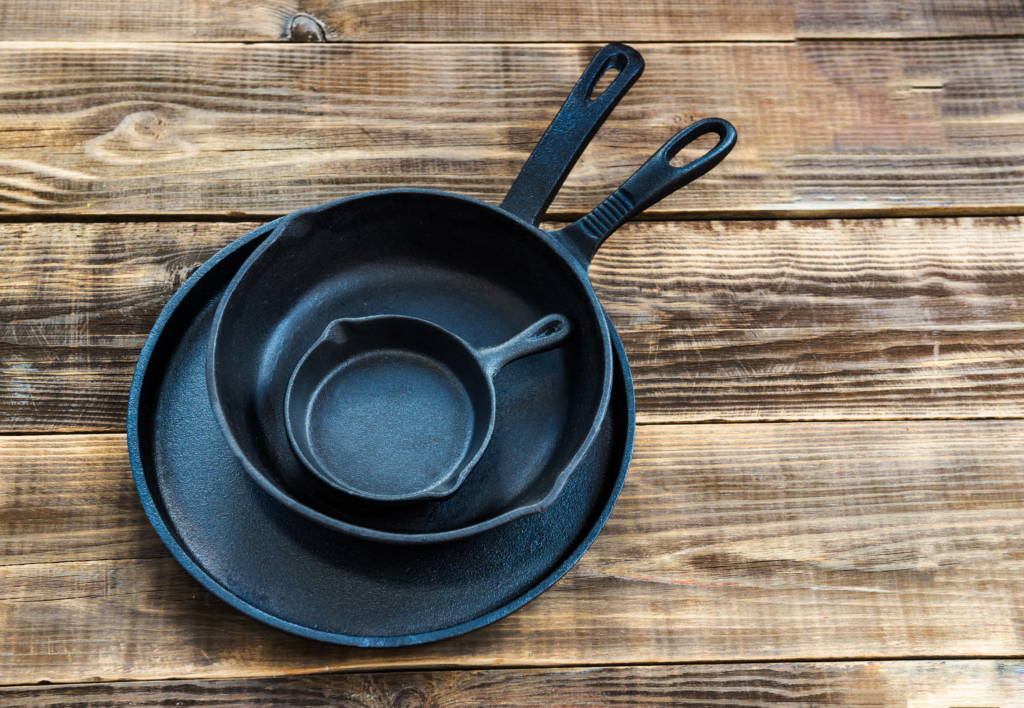
Cast iron is also prone to rust when exposed to excessive water and humidity present inside a dishwasher. Rust not only ruins the appearance of your cast iron skillet but can also cause damage to the pan’s cooking surface, negatively affecting its performance.
To keep your cast iron cookware in good shape, always opt for hand washing. Simply rinse the pan in hot water and gently scrub it with a brush or non-abrasive sponge to remove any stuck-on food particles. If needed, you can use a little bit of mild dish soap, but be aware that too much soap can remove the seasoning. After washing, thoroughly dry your cast iron pan with a clean cloth or paper towel and store it in a dry place.
Your pans will thank you!
Wooden Utensils and Cutting Boards
Wooden utensils and cutting boards are essentials in every kitchen. However, it’s crucial to know that these items should never be put in a dishwasher.
Wooden utensils and cutting board should never be put in the dishwasher because the high heat and water pressure of dishwashers can cause the wooden items to warp, crack, or become discolored.
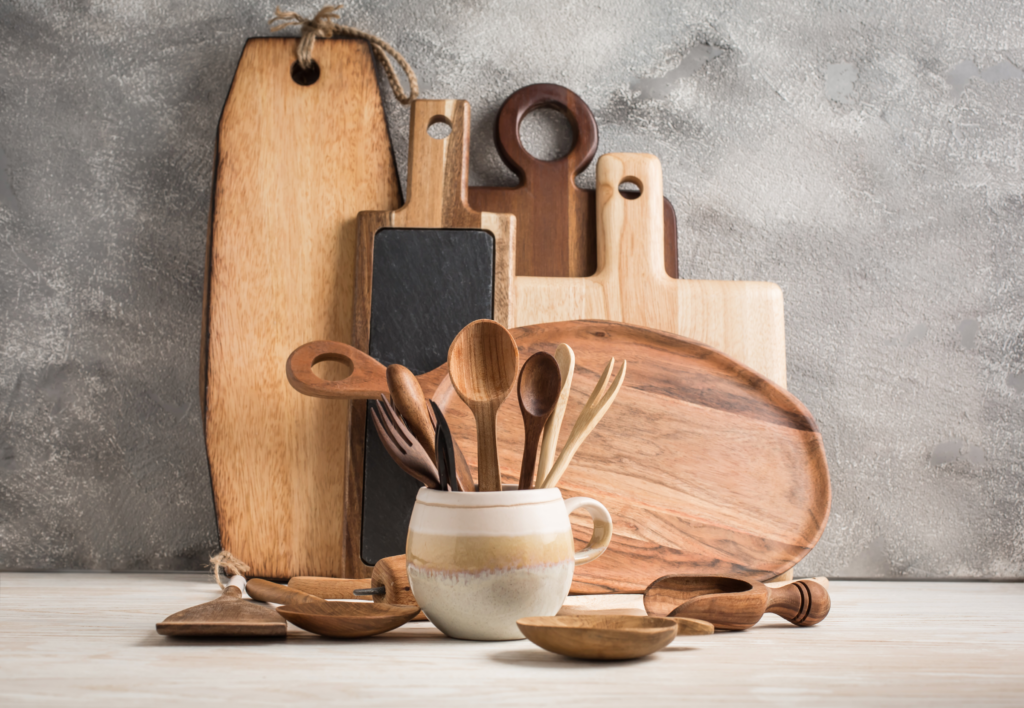
Instead, you should always hand-wash wooden kitchen stuff.
All you need is some warm soapy water, a sponge, and a bit of elbow grease. Gently scrub the wooden items clean, but don’t allow them to soak in water too long, as this can also cause damage to the wood. Drying off your utensils and cutting boards with a towel is just as important. This helps prevent any moisture-related issues and ensures that they’re ready for their next use.
Wooden spoons, in particular, are susceptible to absorbing odors and food particles. So, make it a habit of cleaning them thoroughly and regularly. Besides, it’s a good idea to occasionally apply a thin coat of food-grade mineral oil on your wooden cutting boards and utensils. This helps maintain their appearance and extends their lifespan.
Insulated Mugs and Thermoses
Insulated mugs and thermoses are great for keeping your drinks hot or cold for extended periods, but you should avoid putting them in your dishwasher because it can straight up ruin them.
Most of these insulated mugs and thermoses work by using a vacuum sandwiched between two layers of material. Unfortunately, the heat inside the dishwasher can crack the seal inside these insulated mugs, releasing the vacuum and completely destroying their insulating properties. Some travel mugs may also have intricate designs or parts that could be damaged during the wash cycle.
When cleaning your insulated travel mugs, it’s best to handwash them using warm soapy water and a non-abrasive sponge or cloth. This will help maintain their insulation properties and ensure they continue to perform well. For those hard-to-reach areas, use a bottle brush to clean the insides thoroughly.
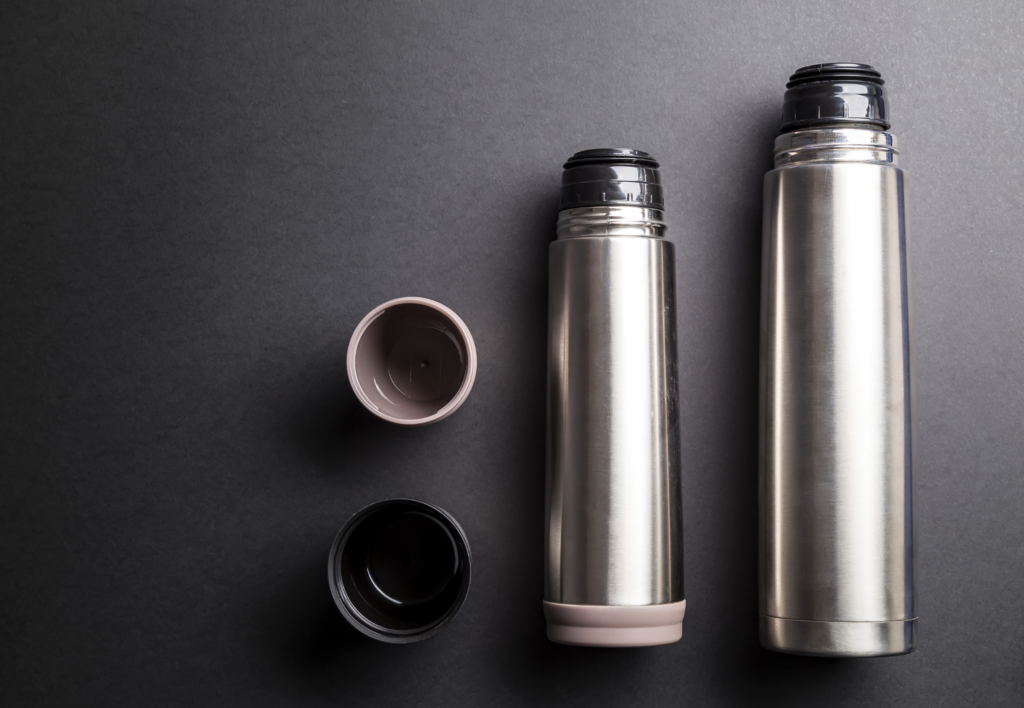
Some tips for maintaining your insulated mugs and thermoses:
- Always empty out your cup as soon as you’ve finished your drink to prevent staining and lingering smells.
- Store them with the lids off to prevent any trapped moisture from causing mold growth.
- Occasionally, deep-clean your cups with a mixture of baking soda and warm water. This can help remove stubborn stains and odors.
Pressure Cooker Lids
Pressure cooker lids are essential for maintaining the high pressure inside the cooker. However, putting them in the dishwasher can cause damage to their delicate components, including the seals. When these parts are damaged, your pressure cooker won’t function efficiently, leading to undercooked meals or safety hazards.
To keep your pressure cooker lids in tip-top shape, it’s best to avoid the dishwasher altogether and wash them by hand instead. Use warm soapy water and a soft cloth to gently clean the lid, focusing on the areas around the seals and any vents or valves. This ensures that no food residue or debris is stuck in these areas, which could affect the cooker’s performance.
Some pressure cookers may come with dishwasher-safe components, but it’s crucial to check the manufacturer’s recommendations before tossing any parts into the dishwasher. Certain materials and finishes could be damaged over time if exposed to harsh dishwasher detergents and high temperatures.
Remember, when it comes to your pressure cooker lids, a little care and attention can go a long way in prolonging their lifespan and ensuring consistently delicious meals. Happy cooking!
Nonstick Pans
Nonstick pans are a great addition to your kitchen, but they require special care. One thing you should never do is put your nonstick pans in the dishwasher.
Here’s why:
- Damage to Nonstick Coating: The heat and detergent in the dishwasher can damage the delicate nonstick coating of your pans. Over time, this can lead to scratches and a loss of effectiveness. To maintain the smooth, non-stick surface, it’s crucial to handle your nonstick pans with care. When it comes to cleaning, gently wash your nonstick pans by hand using a soft sponge and mild soap.
- Shortened Lifespan: Nonstick cookware is not designed to withstand the harsh environment of a dishwasher. Constant exposure to high temperatures, steam, and strong detergents can cause the nonstick coating to wear off more quickly, reducing the lifespan of your pans. By hand washing your non-stick pans, you can help to preserve their longevity and keep them looking and working like new.
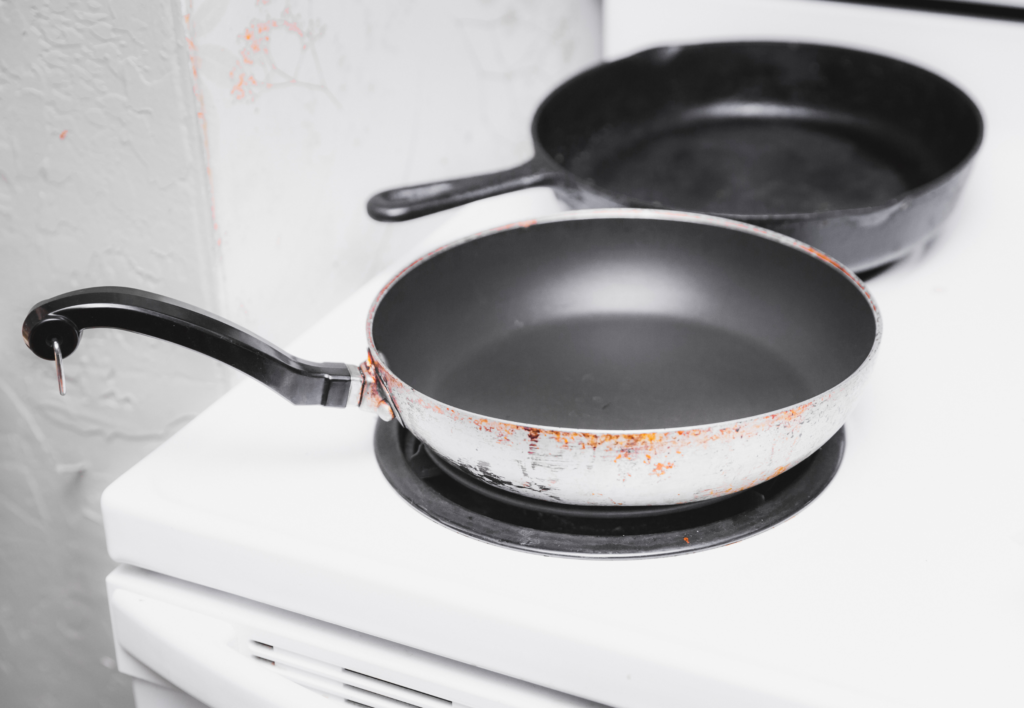
Additional Tips: To further protect your nonstick pans, avoid using metal utensils on the surface, which can easily scratch the nonstick coating. Instead, opt for wooden or silicone implements. Also, refrain from overheating your nonstick cookware, as excessive heat can cause the nonstick properties to break down.
Aluminum Cookware or Disposable Items
When it comes to aluminum cookware and disposable items, it’s important to know that not all are dishwasher safe. Putting non-anozided aluminum in the dishwasher can cause discoloration, dulling, and even damage to the material.
Aluminum, unless anodized, can react to the harsh detergents and high temperatures in the dishwasher. This may cause it to be covered in a dark film or white spots.
To prevent this, it’s best to hand wash your aluminum cookware.
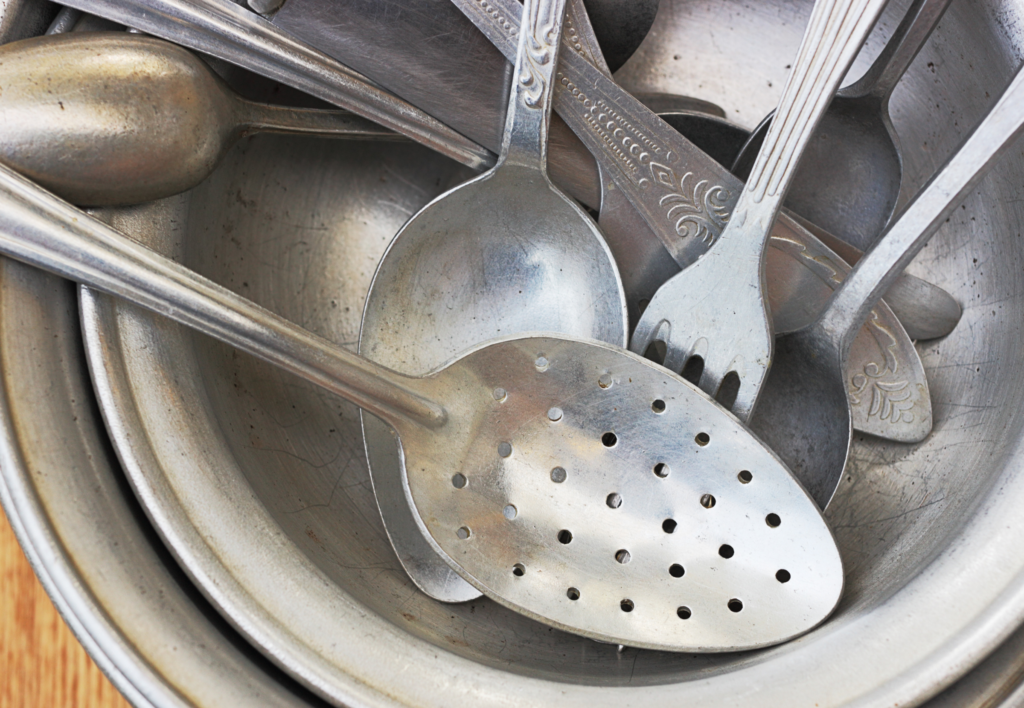
When it comes to disposable items like plates and aluminum serving pans, these too should be kept out of your dishwasher. The thin material can be easily bent or crushed by water pressure, creating potential issues for your dishwasher’s draining system.
To keep your kitchen items in the best shape possible, follow these simple tips:
- Hand wash aluminum cookware with warm, soapy water and a soft sponge or cloth to prevent scratches or damage.
- For stubborn residue on aluminum cookware, use a mix of white vinegar and water to gently dissolve any stuck-on food.
- If you must use a dishwasher for your aluminum items, opt for a gentle cycle and use less harsh detergent.
When in doubt, hand washing is always a safe and effective option.
Copper Pots and Pans
Copper pots and pans are a beautiful addition to any kitchen, but they must be handled with care. When it comes to cleaning, never put them in your dishwasher.
The harsh chemicals and high heat in a dishwasher can cause corrosion, which damages the copper.
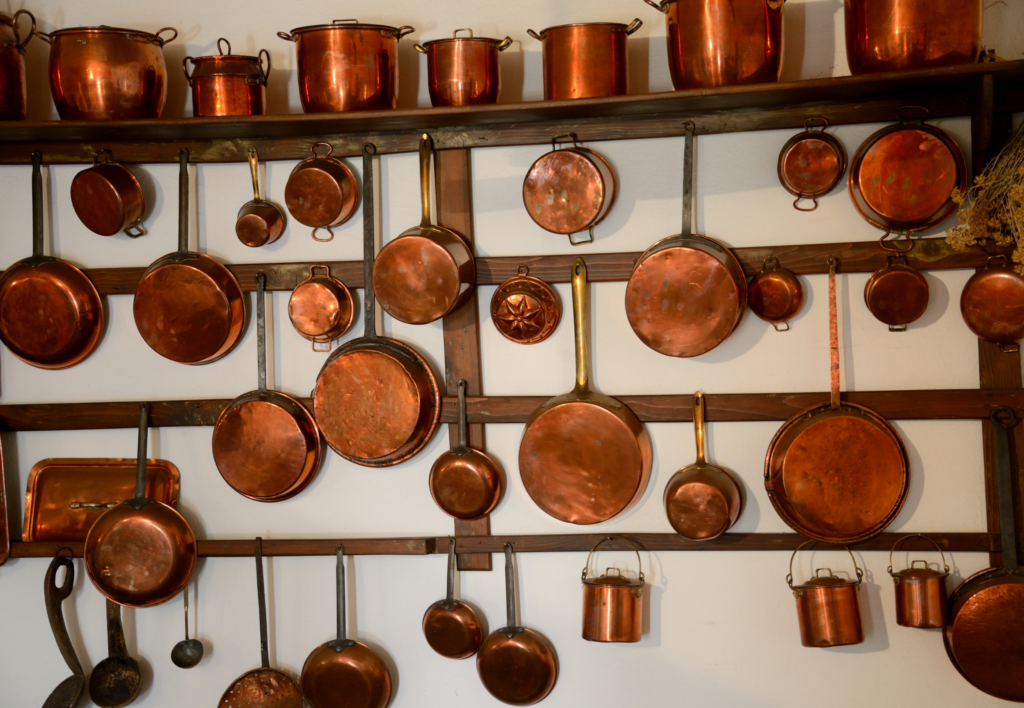
Instead, follow these tips to ensure your copper cookware maintains its shine and function:
- Hand-washing: Gently wash your copper pots and pans by hand using warm, soapy water and a soft sponge. This helps to protect the delicate surface from scratches and removes any leftover food particles.
- Drying: After washing, make sure to dry your copper cookware thoroughly with a dry cloth. Copper can tarnish if left wet, so it’s important to keep them dry when not in use.
- Polishing: To maintain the appearance of your copper pots and pans, give them a regular polish with a copper cleaning product or a homemade solution of lemon juice and salt. This will help retain their beautiful shine and prevent oxidation.
In addition to copper pots and pans, other copper items should also be kept out of the dishwasher. For example, Moscow Mule mugs are usually made of copper and require the same care and attention as cookware.
Some Plastic Items (especially ones with rubber seals)
Plastic items, particularly those with rubber seals, can be affected by the heat and water pressure in a dishwasher. This can cause them to warp or become damaged, thus reducing their ability to seal properly and maintain their shape. Additionally, softer plastics and those found in thin plastic containers can also be damaged in the dishwasher.
To ensure the longevity of these items, it’s best to hand-wash them using warm, soapy water. This is particularly important for items such as plastic measuring cups, spoons, and containers with rubber seals, as well as any containers made of softer plastics.
Sharp Knives
Putting sharp knives into your dishwasher can cause severe damage to both the knives and the dishwasher. The high heat and humidity during the washing cycle can lead to rust and corrosion on the knife’s blade, making it dull and potentially unsafe to use.
Furthermore, the dishwasher’s aggressive environment can cause the handles of your knives, especially those with wooden handles, to weaken and deteriorate.
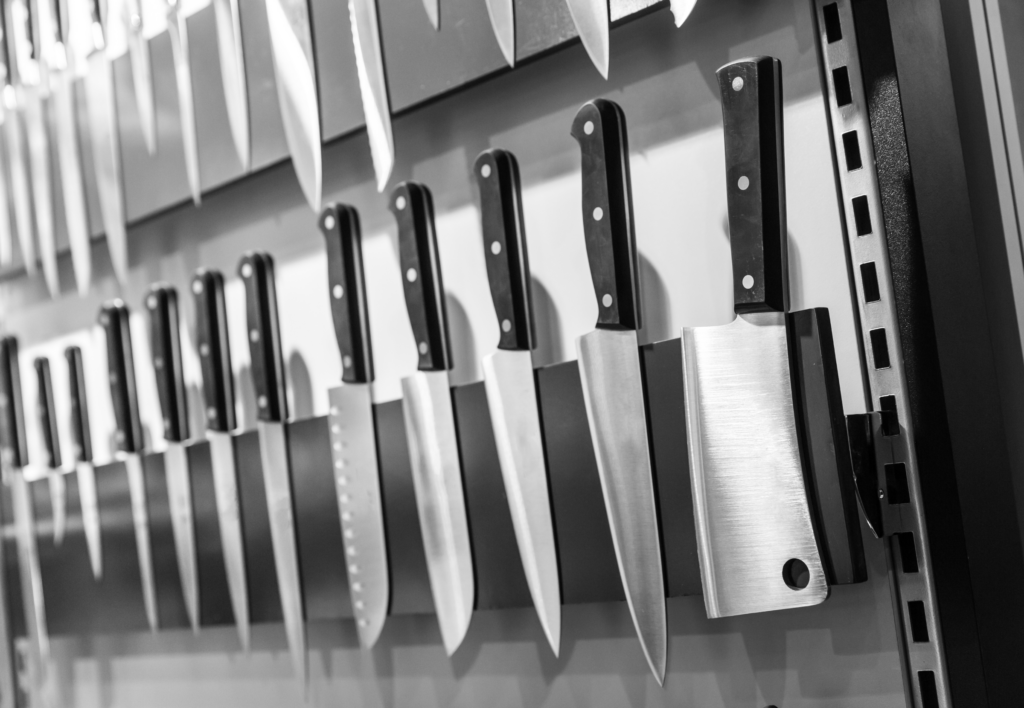
Hand-washing your kitchen knives is a much safer alternative to maintain their sharpness and extend their lifespan.
When hand-washing your knives, follow these tips:
- Gently wash the blade under running water with a soft sponge and mild dish soap to remove any residue.
- Avoid soaking the knives, as this may cause them to become nicked or damaged.
- Be cautious when handling the blade, as you don’t want to accidentally cut yourself while cleaning.
- After washing, immediately and thoroughly dry the knife with a clean, soft towel to prevent any moisture-induced damage.
By taking these simple hand-washing precautions, you can ensure that your sharp knives remain in optimal condition and continue to perform well in your kitchen.
Hollow-Handle Knives
Hollow-handle knives are a common type of kitchen knife that you should think twice about putting in the dishwasher. These knives have a hollow handle, which can trap water and lead to rust or corrosion.
To keep your hollow-handle knives in top shape, it’s best to hand-wash them instead of using the dishwasher.
When hand-washing your hollow-handle knives, be sure to use warm, soapy water and a soft sponge or cloth. Avoid using abrasive cleaning tools, as they may damage the knife’s finish. Furthermore, always dry the knife thoroughly with a clean towel before storing it. Drying your knives prevents moisture from remaining in the hollow handle, ultimately prolonging their lifespan.
For the sake of your hollow-handle knives, consider these simple yet effective hand-washing tips:
- Always wash the knives soon after use to prevent food residue from hardening.
- Hold the knife by the handle, keeping your fingers away from the sharp edge.
- Rinse with warm water before and after washing with soapy water.
By following these guidelines and avoiding the dishwasher, your hollow-handle knives will remain dishwasher-safe and in excellent condition for years to come.
Items with Adhesive Labels
Adhesive labels on your items can cause problems when placed in a dishwasher. The heat and water can cause the labels to peel off and get stuck in various parts of the dishwasher, potentially leading to clogs or damage to the machine. It’s best to hand-wash items with adhesive labels to prevent these issues.
When hand-washing items with adhesive labels, you should:
- Use warm, soapy water to gently scrub the surface of the item.
- Avoid scrubbing the label itself too harshly, as this could cause it to peel and become damaged.
- Rinse the item thoroughly, ensuring all soap residue is removed.
There are also a few techniques you can try to remove stubborn adhesive residue from items you’ve already washed:
- A small amount of rubbing alcohol or acetone can help break down the adhesive.
- You can also use a hair dryer to heat the adhesive, making it easier to peel off.
- If all else fails, a mix of baking soda and cooking oil can help to gently scrub away the residue.
In conclusion, it’s best to hand-wash items with adhesive labels to prevent damage to your dishwasher. If you’ve already washed an item with a label and are left with tough residue, try using the removal methods mentioned above. Remember to always handle your items with care and treat adhesive labels gently.
Crystal and Hand-Painted Glassware
When it comes to your delicate crystal and hand-painted glassware, it is best to keep them away from the dishwasher. The high heat and harsh detergents used in dishwashers can damage these fragile items, causing them to lose their beautiful sparkle and unique designs.
Your crystal glasses, like champagne flutes and fancy wine glasses, can get chipped or cracked when placed in the dishwasher. To prevent this, gently wash each piece by hand, using a mild soap and warm (but not hot) water. Be sure to handle them with care, as they can be quite delicate.
For hand-painted glassware and dishes, the dishwasher can cause the paint to fade or chip away, ruining the intricate patterns and designs. Again, it is best to wash these items by hand. Use a soft sponge or cloth to avoid scratching the surface, and remember to avoid using abrasive cleaners, as they can damage the paint further.
Gold-Trimmed Dishes and Flatware
When it comes to keeping your gold-trimmed dishes and flatware looking pristine, it’s best to avoid placing them in the dishwasher. The harsh detergents and high water temperature can cause the delicate gold plating to wear off or become tarnished.
Fine china, especially those with gold accents, should be hand-washed gently with a mild detergent and a soft cloth or sponge. This will help to preserve the beauty and value of your dishes. Pay close attention to gold-trimmed plates and cutlery, as the dishwasher’s abrasive nature could damage the intricate detailing.
As for gold flatware, the same rule applies: Keep it out of the dishwasher. Hand-washing your gold cutlery ensures that the sparkle and shine remain intact. To maintain their luster, you can periodically use a gentle cleaner made specifically for polished metals.
Let Us Know How We’re Doing!
Did this expertly prepared resource answer your question?
Do you have another question about home maintenance, home improvement projects, home appliance repair, or something else?
Get more information, send in questions and keep the discussion going by contacting the I’ll Just Fix It Myself company customer service team at at 1-800-928-1490 or Email us at [email protected]
